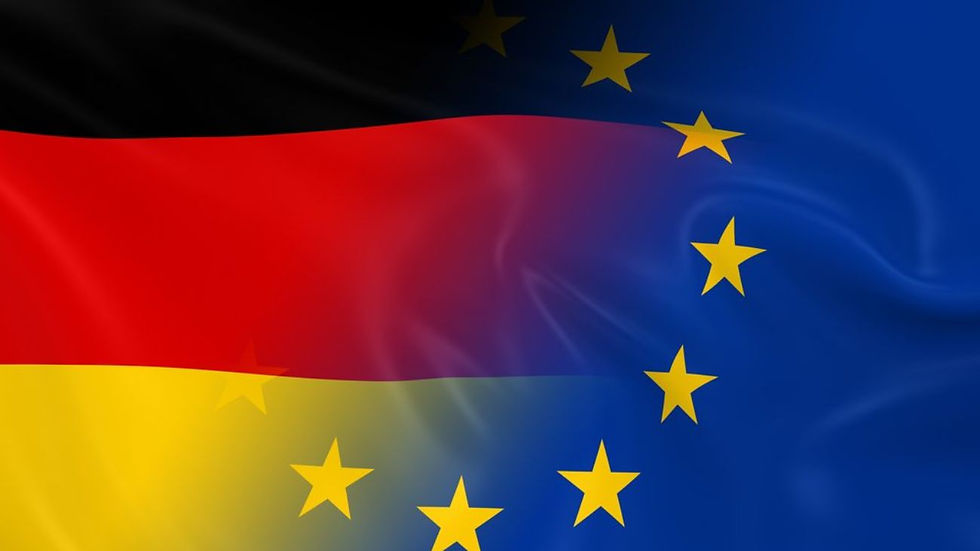The Impact of Covid-19 on the Global Economy & Geopolitics
- Oliver Green

- Jan 16, 2022
- 3 min read
Updated: Jan 28, 2024

By Oliver Green
After the worldwide onset of Covid-19, the IMF not surprisingly revised its global GDP growth forecast for 2020 from +3% to -3%. But, despite the obvious and inevitable hit to global growth in the short term, the longer term impact of Covid on the course of globalisation and geopolitics is rather inconsequential and something of an historical footnote with regard to the shape and course that globalisation is taking, as its direction both regionally and globally was already decided by the Global Financial Crisis of 2008. However, the impact which Covid will have on the pace in which globalisation and geopolitics has been altering since 2008 cannot be overstated.
Firstly, as I explain in two other articles on the EU and Germany, the disintegration of the EU and Eurozone as we know it is inevitable. But this latest “Black Swan Event” has served to accelerate it further, by reinforcing the need and relevance of individual nation states with enforced boarders to give priority to caring for their own citizens, rather than a collective and remote autocracy of “member states” with drastically divergent economies and competing interests. Prof George Friedman summed this up brilliantly when he pointed out that an institution like the EU cannot last over the long term, as the citizens of it have no meaningful emotional, impassioned or moral obligation to it, other than what they can get out of it. An autocracy like the EU is only justifiable during the “good times” of high growth rates when it has no challenges to contend with, and on the surface can appear to be working. But with depression levels of unemployment in southern Europe including 50% youth unemployment since the Financial Crisis, such illusions have already been shattered. Furthermore, the IMF forecast of a -7.5% contraction in 2020 for the Eurozone, coupled with the $81 Billion hole in the EU annual budget left by Brexit, any hope of a sustained lessening of downward pressure has been dashed.
Secondly, China’s marked slowdown and impending stagnation (similar to that of Japan after 1991) has been moved forward, not to mention it standing and position in the world regarding its culpability over the virus. Despite advances toward broader domestic consumption, China’s economy remains heavily export driven and reliant on the US market, with a whopping 20% of its exports being dependent on American demand, which evaporated in the second quarter of 2020, along with other western markets. Consequently, the IMF revised its Chinese growth forecast for 2020 from +6.1% to just +1.2%, a growth rate well below what is required to support the jobs and living standards of its population of 1.4 Billion people, arguably leading to a contraction in real terms, serving as a catalyst towards the stagnation and political fracturing of a country already experiencing massive inequality between its coastal regions and populated interior. China also lacks sufficient natural resources for its demands, and large parts of the country are uninhabitable desert and jungle, and also faces its own issue of an ageing population.
However, the outlook for Russia is even worse, as it failed to modernise and diversify its economy between 1992 and 2008, and remained dependent on oil exports for 30% of its annual GDP. Consequently, Russia remains highly sensitive to oil price fluctuations whilst having no ability to control or significantly influence them. Ideally, the Russian government needs oil prices to average around $70 a barrel to prosper, or about $40 a barrel to balance its budget. But, with oil prices cratering around $20 a barrel, this ceased to be a sustainable proposition.
Consequently, the Russian Federation finds itself facing the same problem the Soviet Union suffered in its final years, namely plummeting oil revenues and consistently high military expenditure in Afghanistan throughout the 1980’s, bringing to a head its impending fragmentation and disintegration. When adjusted for inflation, the average annual oil price in 1980 was around $117 a barrel, but by 1989 it had plummeted to around $38. Thirty years later the same dynamic has occurred, (partly as a result of the United States becoming and remaining energy independent and a net oil exporter.) With Russia remaining involved in Ukraine and heavily committed in Syria, the risk of further fragmentation is only too apparent, especially in the southern Caucasus. So, regardless of the speed of the expected global rebound as forecast by the IMF of between +5% and 6% growth from 2021, none of the fundamentals of globalisation and geopolitics were changed by the virus. Covid-19 merely served as a catalyst for the path already determined by the Global Financial Crisis of 2008, with the 21st Century remaining uni-polar and American for its duration.









Comments